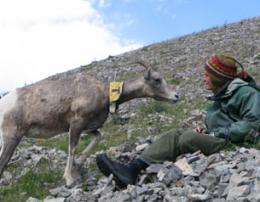Personality types may contribute to genetic success of bighorn sheep

(PhysOrg.com) -- There must be times when University of Alberta researcher David Coltman wishes his study on animal personalities focused on something small, like a house cat. Coltman would classify cats that bring home dead mice as "bold" personalities and tabbies that stick close to their food bowls and the couch would be ranked as "shy."
No such luck for Coltman. He and his colleagues are trying to find out what makes a bighorn mountain sheep tick. They do that by trekking deep into the foothills of the Rocky Mountains to a place called Ram Mountain. They trap mountain sheep in a plywood box with walls five-metres high.
And they just don't watch the animal; they go into the box with it.
In addition to weighing and measuring the animal, the researchers gauge its personality by how much of a fight it puts up. Coltman and the research team are trying to figure out if personality type has anything to do with how long a mountain sheep lives or how many offspring it produces. With the male mountain sheep, a typical bold personality will try and steal away a ewe from the older dominant ram. Coltman equates that to a "live fast, die young," mentality seen regularly in the human world.
It's a trade-off in lifestyles or as Coltman calls it, "life history strategies."
"Patient, less aggressive males bank on living long enough to become the dominant ram and produce lots of offspring," he said, adding the "bad boy" personalities of the bighorn mountain sheep world are the young rams that want it all, right now.
"We just dreaded when one ram we nicknamed 'Psycho' turned up in a trap," said Coltman. "Year-in and year-out Psycho's reaction was the same."
"He tried to kill us."
Psycho was a difficult and dangerous subject, but Coltman says the ram provided a prime example of a strong personality. "Psycho showed repeatable aggressive behaviour-it's an aspect of his temperament that never wavered." It took two researchers to handle an aggressive mountain sheep. The average ram weighs 125 kilograms
The ram called Psycho scored high on the scale of aggressive behaviour, and he got points for another measure of personality, boldness. The trap was set with a salt lick as bait. Bold animals were captured many times over the years because their desire for salt overcame their fear of the enclosure. Coltman says that while some captured rams and even ewes will put up a fight, others are complete pussycats.
"With some ewes you just put your hand on their head," said Coltman. "They just sit back on their bums and you can measure and weigh them, it's easy."
Coltman is co-author of a recent paper on animal personality research published in The Journal of Evolutionary Biology.
The Ram Mountain trap and release study has been going on for close to 40 years so researchers have recorded lots of repeatable behaviour on individual mountain sheep and can see the same trends in their offspring.
"Mothers who are bold tend to have offspring who are bold," said Coltman. "But we want to dig deeper. We want to find out if there are certain genes or receptors in the sheep's brain that are responsible for different personality types. We don't know that yet."
Coltman says research into the personalities of wildlife is a growing field and one day the information could be of use to livestock producers and even pet owners. "Domestic breeders might want to focus on animals less prone to stress for the benefit of the animals and the people around them."
Provided by University of Alberta (news : web)
















